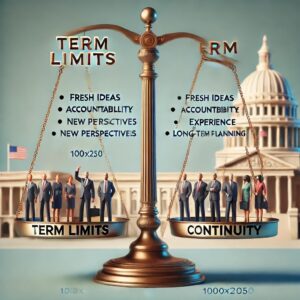Term limits for elected officials have long stirred debate among political scholars, lawmakers, and the public alike. While the idea of limiting terms resonates with those eager for fresh leadership and a government responsive to the people, it also raises questions about the loss of valuable experience and continuity in governance. Are term limits the key to accountability, or do they undermine the stability needed to carry out long-term policies? This article dives into the heart of the debate to weigh both sides, shedding light on why this issue remains both timely and contentious.
Supporters of term limits argue that capping the time an official can hold office encourages a healthier, more dynamic political landscape. Here are some of the core arguments from proponents:
Term limits, they argue, help prevent the entrenchment of power that can lead to complacency or even corruption. By limiting terms, politicians must prioritize serving the public effectively within their allotted time. This accountability can refresh political commitment and keep leaders attuned to their constituents’ needs.
Without term limits, some argue, officials risk becoming “career politicians,” losing touch with the daily struggles of the public. Term limits would encourage representatives who bring new perspectives and who are less likely to adopt the “insider” mentality that sometimes distances long-serving officials from the people they serve.
New leaders bring new ideas, and turnover allows for fresh perspectives that can lead to more innovative policy solutions. Proponents suggest that term limits can make way for those who understand the evolving nature of issues like technology, environmental changes, and shifting social dynamics.
Critics of term limits, however, caution that capping terms comes at the cost of losing experienced, knowledgeable leaders. Here’s why opponents believe term limits may do more harm than good:
Effective governance often relies on a long-term vision and the ability to carry out policies that span years or even decades. Frequent turnover can disrupt ongoing projects and policies, weakening governmental stability and continuity. Imagine a key infrastructure project repeatedly delayed because new leaders keep changing priorities. Opponents argue this instability does little to serve the public in the long run.
Governance is complex, and the longer someone serves, the more institutional knowledge they acquire. Critics argue that this experience benefits constituents, as officials become adept at navigating bureaucracy, understanding intricate issues, and building relationships across party lines. Losing such expertise too quickly, they suggest, limits the effectiveness of leadership.
Some argue that term limits may create a vacuum where lobbyists and unelected influencers hold more sway, as newly elected officials may lack the knowledge or connections to resist pressure. With term limits, lawmakers may rely more on external advisors and think tanks, potentially diminishing their independence and weakening the role of elected leadership.
For some, the solution lies not in strict term limits but in reforms that balance both continuity and accountability. Alternatives might include partial term limits, mandatory gaps between terms, or performance-based measures that incentivize effective governance. Voters might also embrace stronger recall options to remove underperforming leaders without sacrificing seasoned officials who are serving effectively.
Ultimately, the debate over term limits reflects a broader tension in modern democracy: the balance between the desire for fresh, responsive leadership and the need for steady, experienced governance. While term limits promise accountability and renewal, they risk undermining continuity and expertise. The decision, as always, lies with the people, who must weigh these values when considering reforms to the political landscape.

